The North-east Indian community in Mumbai recently launched a help service that seeks to address issues related to racism, sexual harassment and other forms of assault on members in the city
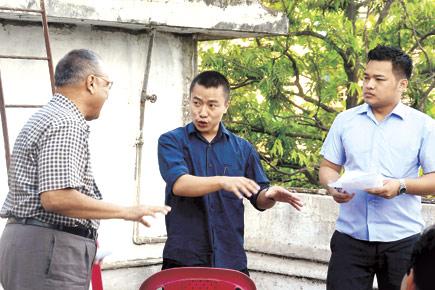
Since the Nido Taniam incident (See box) created waves in the political and social circles in India, the North-east Indian community along with the government across the country has been trying to do their bit to make people from the community feel safer in metro cities.
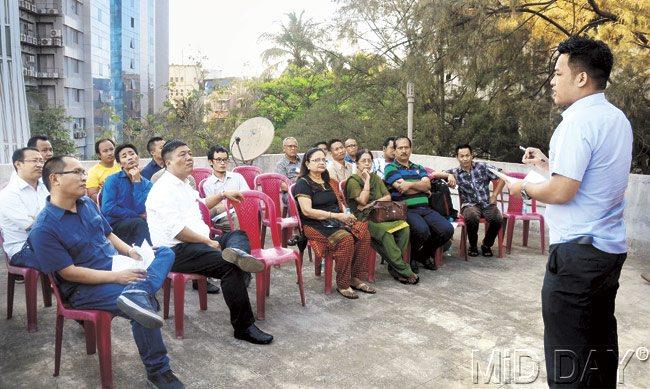
People from the North-east community meet at Kalina, Santacruz
ADVERTISEMENT
For the city of Mumbai, like they have in Delhi since 2007, the North-east Indian community has started a helpline, a phone service that will provide assistance to those from the community who face various forms of discrimination.
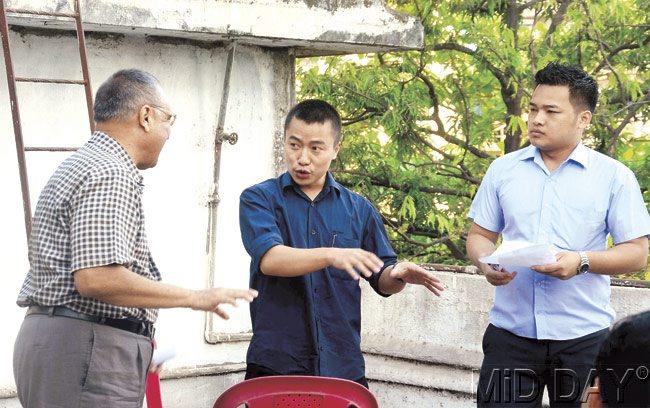
North-east community members discuss racism. Pics/Satyajit Desai
Birth of a movement
Launched on March 14, the North-east Helpline, Mumbai has its office in Kalina, Santacruz. The helpline started off an aggressive campaign with more than 500 likes on its Facebook page.
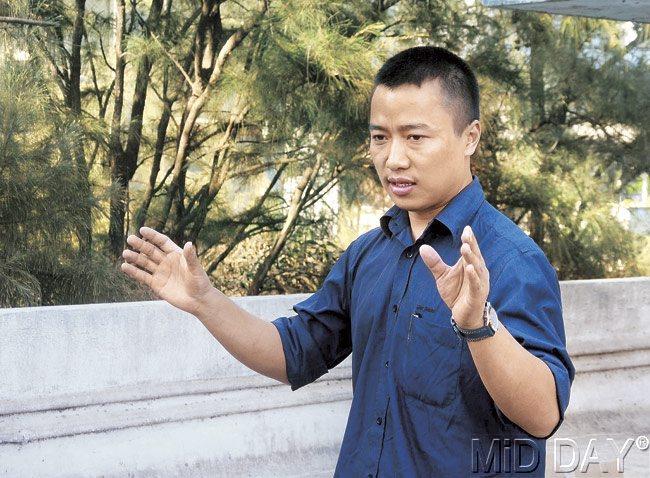
So So KJP
Lalramthang Amo, Board member of the North-east Helpline in Mumbai said, “The objective of launching this helpline is to address the grievances faced by the North-eastern people in the city.
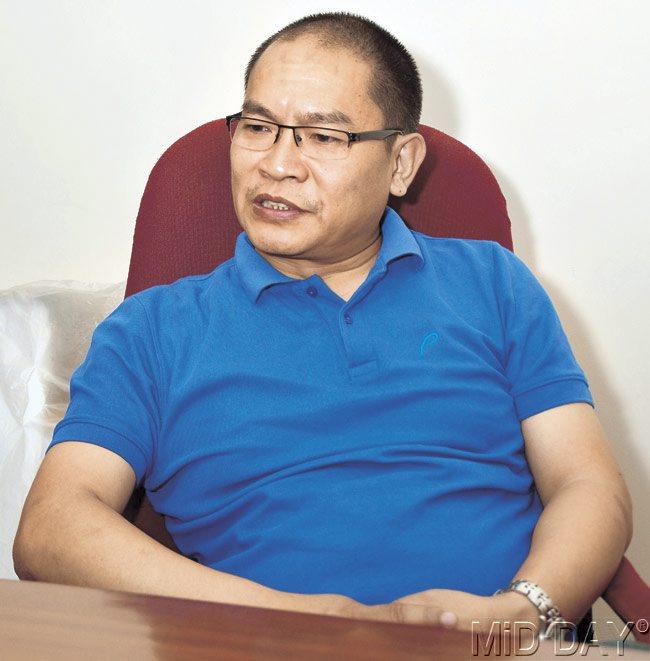
Lalramthang Amo. Pic/Prashant Waydande
Even though we feel Mumbai is safe, there are several cases of racial discrimination and attacks on North-east Indian people residing in the city which propelled us to start this helpline.”
First distress call
So far the helpline has received 18 calls and an incident on Holi night when a group of youngsters from Arunachal Pradesh were beaten up in Vashi was the first big happening for this distress call service.
“The police was called and the matter reported, but the perpetrators of the crime are still at large but we are happy that the police were open to reporting the matter which is often not the case. Since our meeting with Rakesh Maria, Commissioner of Police, Mumbai prior to the launch of this helpline, the police as a force has been more positive towards addressing our grievances,” said Amo.
A welcome initiative
For So So KJP who is pursuing his IAS exams, the helpline is a platform for the community to express themselves. He said, “After the death of Nido Taniam, many North-east people were confused about whom they should approach and what they should do when they face racial attacks and other crimes which has now become an almost given of daily life for us.
At first we ignored any remark made against us, even though internally it made our blood boil, but after the incident in Delhi we are all afraid that we may have to pay with our lives.” Echoing the sentiment, Irene Amo who hails from Meghalaya who has been staying in Mumbai for the last 14 years said, “This helpline makes many people from our community feel safe, secure and happy that the government has agreed to help address our issues.”
Top problems
“From racial slurs, to jokes on looks, assaults by landlords and employers, molestation, etc are the main problems we get calls and information about,” reveals Lalramthang Amo whose number is among the five mentioned on the helpline website and Facebook page.
Talking about her experience as a person who looks different from the others in Mumbai, Irene said, “People think we eat snakes, are from China, Nepal, and Malaysia; for some reason they just love staring at us which personally makes me feel cheap. As a woman, the Hindi songs being sung every time I pass by, being taken for a ride literally when I travel by taxis and rickshaws are a double problem. I face racism and sexual harassment which both make me sick to the core.”
So So KJP who hails from Manipur reveals, “There was this time in November last year when an accident happened where a person from the North-east was hit. It was a huge task getting an FIR registered. But now with this helpline hopefully things will be better.”
Double trouble
Irene reveals that not just roadside Romeos, but also old men have sexually harassed her, “I was in college at Xavier’s and was wearing a T-shirt and full length jeans when near Marine Lines station, a man who was old enough to be my grandfather started saying, ‘aye sexy’ followed by some really bad and sexist words.
I asked him why he was teasing me and this made him realise his mistake and he apologised. But it isn’t often that people admit their fault. Very often people ask, ‘main kya kiya’. Stereotyping and racial misconceptions are really pathetic excuses for justifying teasing women or passing comments against people from the North-east.”
Atithi devo bhav
In the North-east the Incredible India tagline is followed more than anywhere else, as So So said, “When people come to the North-east, we always cut the fattened chicken and welcome them. Yes, we are a minority but that doesn’t give anybody a reason to call us ‘hakka’ or ‘Nepali’ or ‘chow mein’. We have Indian blood just like the others. It’s good to say we treat foreigners well in India, why can’t we treat our own brothers and sisters a little more like we would like to be treated?”
Patrons of the cause
Alana Golmei who was instrumental in starting the Delhi helpline to address the issues of the North-east community along with Dr. Abraham Mathai, a Mumbai-based Human Rights activist and former Vice-Chairman of the Maharashtra Minorities Commission have been the patrons of the Mumbai helpline.
Amo credits these two as being instrumental in helping to start the helpline in the city, “Alana shared the success of the Delhi model with us which we hope to emulate in Mumbai. To have a stronger reach we have gotten in touch with the various unions in Arunachal Pradesh, Assam, Mizoram, Meghalaya, Nagaland, Tripura and Manipur who know the people who have come to Mumbai for education or work.
Racism and harassment is a common problem faced by North-east people in the work force and on the streets, we are trying our best to stop this. The Mumbai police have actually given us a special direct number which we can use to report crimes that we come across.”
A social worker who has fought strongly for the cause of the oppressed in the last 10 years, Dr Mathai has allowed the North-east Helpline, Mumbai to run their office in his building in Santacruz. Mathai said, “I wholeheartedly support this cause.
This year, Holi which always saw high numbers of molestation cases reported, thanks to the police intervention and the helpline saw no cases reported. Social responsibility and awareness are needed for this helpline to truly become a force of change.”
A cup of tea to end racism
For Ma Kima who is a well-known blogger and runs his own android game company; racism has become something he deals with on a daily basis be it in Mumbai or Delhi. The Mizoram native who has lived in Mumbai for more than seven years said, “I was racially abused by a policeman some time ago and offered to teach him about the North-east.
Though he turned down my offer, I went on to write about this on my blog and the Deputy Commissioner of Police in Mumbai read about it and came forward to have tea with me. At the tea party, he also brought with him some of his policemen and I went on to educate the cops about the North-east. Some of the policemen had never heard of anything beyond Assam. Nagaland, Tripura, Meghalaya are all as alien as Timbuktoo to them.”
Friends of the North-east
Very often language is a big barrier for people from the North-east when they try to communicate with others. Kima at the North-east meet in Mumbai on March 22 where people from different parts of the seven sister states came together to help end language problems, suggested some ways for North-east Indian people to become more proactive and shed their timid nature.
“Taking along a friend who is well-versed in Marathi can be a great way of getting work done, especially in government offices and at police stations. These non-North-east people will also be sympathetic to our problems and we will also be able to communicate effectively with our neighbours which will ensure more acceptance,” suggested Kima.
No racism in Mumbai
The Mumbai police are also positive about the helpline and are just a call away if they receive any distress call from the North-east community in the city. Inspector Sharad Kulkarni, from the Santacruz police station in whose area about 400-500 North-east Indian people stay said, “Racism is a big problem in Mumbai. We are working in tandem with the representatives from the North-east community to solve the problem.
Rakesh Maria has informed all the policemen in the areas where the North-east community lives to pay heed to the problems of this community. There is a special line which has also been provided to the community. Our aim is to fully put an end to racism in Mumbai.”
Sociologically speaking
Vinita Bhatia, Anthropology and Sociology professor at St. Xavier’s College, Mumbai tries to shed some light on why the North-east people face racism in India, “Perhaps they are viewed as a threat as they get privileges from the government. It is ultimately a struggle for limited resources.”
Bhatia suggests a way to end racism, “There is a need especially on the side of the government that they create awareness about the cultures of the North-east and thereby an appreciation for other cultures rather than fostering contempt. Lack of understanding of cultures other than our own known as Ethnocentrism where we always look at the ‘other’ as inferior, is often the prime reason that leads to racism.”
Community leaders ahead
The North-east community has selected leaders from each of the seven states of the region who will be the touch points when it comes to dealing with problems faced by the community in Mumbai.
With the hope that the helpline, Mumbai police and the North-east people could work together, putting aside their differences, Amo ends, “At the moment we are very happy with the response both from the community as well as the police, hopefully the racial attacks will stop as awareness increases.
We are on our part urging people from the North-east to be as open as they can to report problems. If racism ends there will be no need for the helpline or for police aid. That is a long dream but at the moment we are happy with the way this helpline has started.”
 Subscribe today by clicking the link and stay updated with the latest news!" Click here!
Subscribe today by clicking the link and stay updated with the latest news!" Click here!







